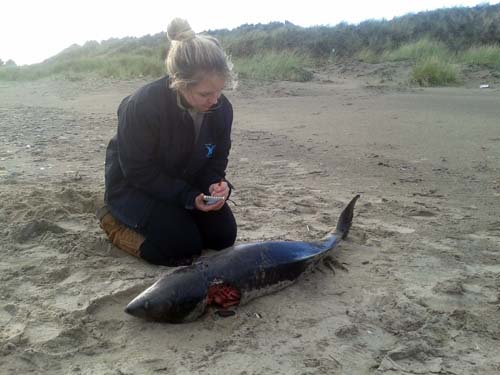
What to do if you find a dead whale, dolphin or porpoise on the beach
If you find a dead whale or dolphin on the beach, you should take the following actions:
- Call your local Marine Wildlife Rescue operator immediately and take their advice. You should also inform the authorities responsible for managing the beach, including the police.
- Do not touch the animal or try to move it.
- Try to keep onlookers and dog walkers away from the animal until the authorities arrive as there is a risk of the animal’s decomposing body becoming a health hazard.
Once you have reported your sighting to your local wildlife operator (see list below), a marine biologist may then visit the site to take a sample that may help to find out more about how the animal died. The local authority will then set about disposing of the carcass so that it does not create a health hazard for the public while it is decomposing.
What to do if you find a live whale, dolphin or porpoise on the beach
You should take the following actions if you come across a live stranded whale or dolphin on the beach:
- Call your local Marine Wildlife Rescue operator immediately and take their advice. You should also inform the authorities responsible for managing the beach, including the police.
- Do not touch the animal or try to move it.
- Try to keep onlookers and dog walkers away from the animal until the authorities arrive. Keep disturbance to a minimum.
- Do not post photos of the animal on social media, especially busy forums, as this will attract more visitors. Not everyone is informed about how to behave around marine animals in distress.
- Observe the animal from a distance of at least 50 feet.
Once you have alerted your local wildlife rescue operator (see list below), they will most likely send a team of volunteers out to the site. However, many wildlife NGOs run on low capacity and if there are no volunteers available, you may well be asked to assist further.
Whale and dolphin rescue missions always require the good will and assistance of the public.
List of Marine Wildlife Rescue Operators – Whale and Dolphin Stranding Contacts
Europe
Republic of Ireland: Irish Whale and Dolphin Group Cetacean Strandings Scheme
Northern Ireland/UK: DAERA Marine and Fisheries Division
Britain/UK: Cetacean Strandings Investigation Programme (CSIP)